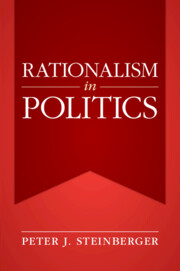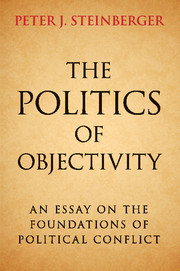55 results
1 - Propositions and Practical Action
-
- Book:
- Rationalism in Politics
- Published online:
- 11 August 2022
- Print publication:
- 25 August 2022, pp 1-66
-
- Chapter
- Export citation
Index
-
- Book:
- Rationalism in Politics
- Published online:
- 11 August 2022
- Print publication:
- 25 August 2022, pp 176-178
-
- Chapter
- Export citation
Preface
-
- Book:
- Rationalism in Politics
- Published online:
- 11 August 2022
- Print publication:
- 25 August 2022, pp ix-xviii
-
- Chapter
- Export citation
Copyright page
-
- Book:
- Rationalism in Politics
- Published online:
- 11 August 2022
- Print publication:
- 25 August 2022, pp iv-iv
-
- Chapter
- Export citation
Dedication
-
- Book:
- Rationalism in Politics
- Published online:
- 11 August 2022
- Print publication:
- 25 August 2022, pp v-vi
-
- Chapter
- Export citation
3 - Rationalism in Politics
-
- Book:
- Rationalism in Politics
- Published online:
- 11 August 2022
- Print publication:
- 25 August 2022, pp 122-175
-
- Chapter
- Export citation
Contents
-
- Book:
- Rationalism in Politics
- Published online:
- 11 August 2022
- Print publication:
- 25 August 2022, pp vii-viii
-
- Chapter
- Export citation
2 - Belief, Truth, and Knowledge
-
- Book:
- Rationalism in Politics
- Published online:
- 11 August 2022
- Print publication:
- 25 August 2022, pp 67-121
-
- Chapter
- Export citation

Rationalism in Politics
-
- Published online:
- 11 August 2022
- Print publication:
- 25 August 2022
Rationalism in Politics
-
- Journal:
- American Political Science Review / Volume 109 / Issue 4 / November 2015
- Published online by Cambridge University Press:
- 10 November 2015, pp. 750-763
- Print publication:
- November 2015
-
- Article
- Export citation
2 - The idea of political conflict
-
- Book:
- The Politics of Objectivity
- Published online:
- 05 August 2015
- Print publication:
- 10 August 2015, pp 61-142
-
- Chapter
- Export citation
Contents
-
- Book:
- The Politics of Objectivity
- Published online:
- 05 August 2015
- Print publication:
- 10 August 2015, pp vii-viii
-
- Chapter
- Export citation
Preface
-
- Book:
- The Politics of Objectivity
- Published online:
- 05 August 2015
- Print publication:
- 10 August 2015, pp ix-xvi
-
- Chapter
- Export citation
3 - Discursive displacement
-
- Book:
- The Politics of Objectivity
- Published online:
- 05 August 2015
- Print publication:
- 10 August 2015, pp 143-193
-
- Chapter
- Export citation
Copyright page
-
- Book:
- The Politics of Objectivity
- Published online:
- 05 August 2015
- Print publication:
- 10 August 2015, pp iv-iv
-
- Chapter
- Export citation
4 - Objectivity and politics
-
- Book:
- The Politics of Objectivity
- Published online:
- 05 August 2015
- Print publication:
- 10 August 2015, pp 194-270
-
- Chapter
- Export citation
1 - Three kinds of objectivity
-
- Book:
- The Politics of Objectivity
- Published online:
- 05 August 2015
- Print publication:
- 10 August 2015, pp 1-60
-
- Chapter
- Export citation
Index
-
- Book:
- The Politics of Objectivity
- Published online:
- 05 August 2015
- Print publication:
- 10 August 2015, pp 271-275
-
- Chapter
- Export citation
Dedication
-
- Book:
- The Politics of Objectivity
- Published online:
- 05 August 2015
- Print publication:
- 10 August 2015, pp v-vi
-
- Chapter
- Export citation

The Politics of Objectivity
- An Essay on the Foundations of Political Conflict
-
- Published online:
- 05 August 2015
- Print publication:
- 10 August 2015



